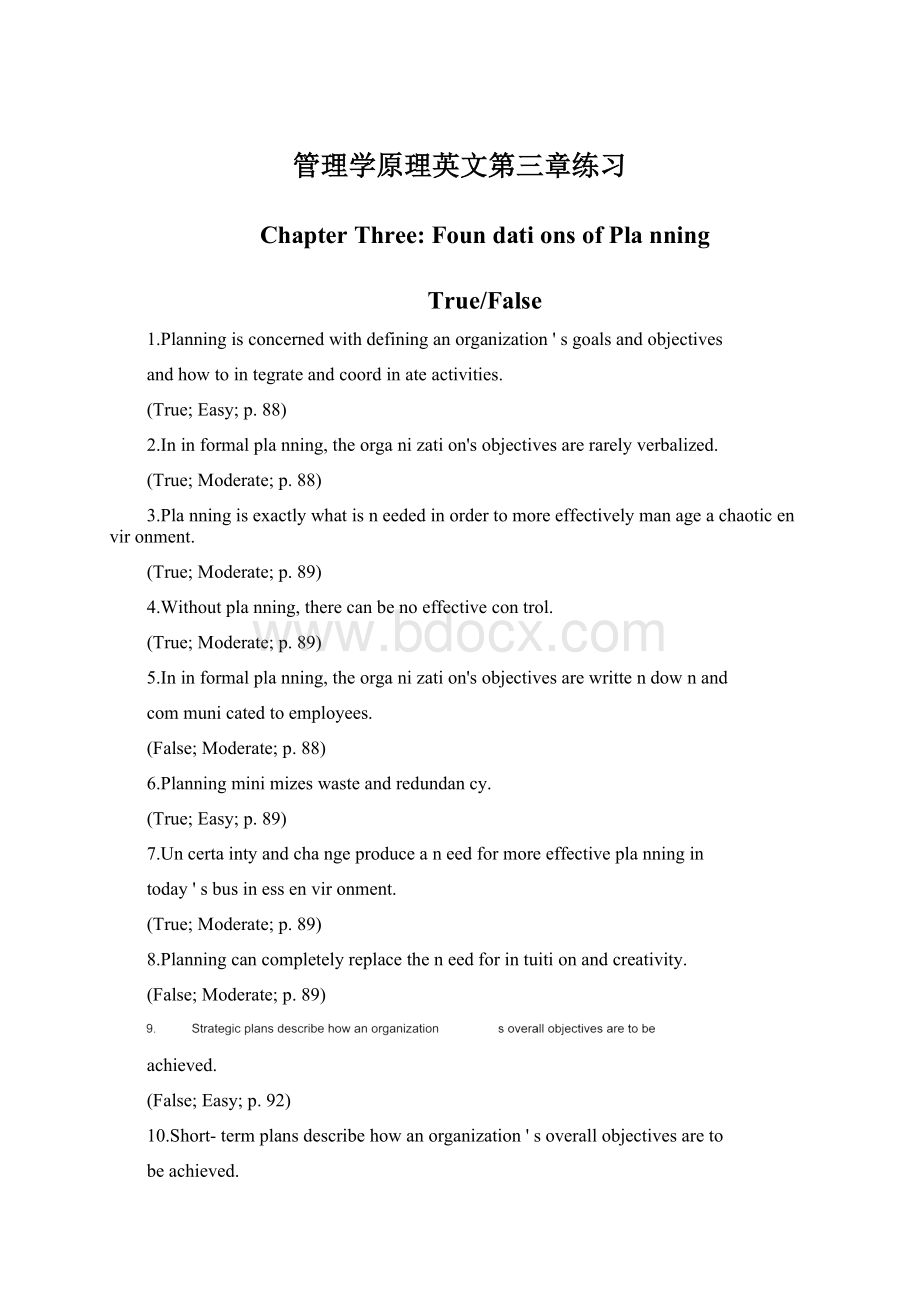管理学原理英文第三章练习.docx
《管理学原理英文第三章练习.docx》由会员分享,可在线阅读,更多相关《管理学原理英文第三章练习.docx(32页珍藏版)》请在冰豆网上搜索。

管理学原理英文第三章练习
ChapterThree:
FoundationsofPlanning
True/False
1.Planningisconcernedwithdefininganorganization'sgoalsandobjectives
andhowtointegrateandcoordinateactivities.
(True;Easy;p.88)
2.Ininformalplanning,theorganization'sobjectivesarerarelyverbalized.
(True;Moderate;p.88)
3.Planningisexactlywhatisneededinordertomoreeffectivelymanageachaoticenvironment.
(True;Moderate;p.89)
4.Withoutplanning,therecanbenoeffectivecontrol.
(True;Moderate;p.89)
5.Ininformalplanning,theorganization'sobjectivesarewrittendownand
communicatedtoemployees.
(False;Moderate;p.88)
6.Planningminimizeswasteandredundancy.
(True;Easy;p.89)
7.Uncertaintyandchangeproduceaneedformoreeffectiveplanningin
today'sbusinessenvironment.
(True;Moderate;p.89)
8.Planningcancompletelyreplacetheneedforintuitionandcreativity.
(False;Moderate;p.89)
achieved.
(False;Easy;p.92)
10.Short-termplansdescribehowanorganization'soverallobjectivesareto
beachieved.
(False;Easy;p.93)
11.Longtermplansdescribewhatanorganizationplanstodowithinthenext
twotothreeyears.
(False;Easy;p.93)
12.Well-thoughtoutformalplanseliminatetheneedtorelyonintuitionand
creativity.AppleComputerisaprimeexampleofthisconcept.
(False;Moderate;p.93)
13.Organizationswithformalplanswillalwaysoutperformthoseorganizations
withoutformalplans.
(False;Challenging;p.91)
14.Tacticalplansformabasisforstrategicplans.
(False;Challenging;p.92)
15.Itappearsthatspecificplansarealwayspreferabletodirectional,or
looselyguidedplans,becausespecificplanshaveclearlydefinedobjectives.(True;Easy;p.93)
16.Standingplansareflexibleplans,withclearlydefinedobjectivesandthat
leavenoroomformisinterpretation.
(False;Moderate;p.94)
17.TheobjectivesinMBOshouldbeconcisestatementsoffinancial
accomplishments.
(False;Easy;p.94)
18.MBOusesgoalstocontrolemployees.
(False;Challenging;p.94)
19.Feedbackfavorablyaffectsperformance.
(True;Moderate;p.96)
20.Anorganization'sobjectivesandstrategiesdefineitspurpose.
(False;Moderate;p.99)
21.Identifyingthescopeofanorganization'sproductsorserviceswillforce
ittodefineitsmission.
(False;Challenging;p.99)
22.Inordertofulfillthegrandstrategy,managerswillseektopositiontheir
unitssothattheycangainarelativeadvantageovertheircompetition.
(True;Challenging;p.105)
23.Porter'sthreecompetitivestrategiesarecost-leadership,price-leadership,
andniche.
(False;Moderate;p.105)
24.Aprojectisanexampleofasingle-useplan.
(True;Moderate;p.94)
25.SWOTanalysisdeterminestheprimarythreatsandopportunitiesan
organizationfaces.
(True;Easy;p.102)
26.ASWOTanalysisconsistsoffourkeysteps.
(False;Easy;p.102)
27.Thegrandstrategiesaregrowth,differentiation,stability,andcombination
strategies.
(False;Easy;p.103)
28.Adifferentiationstrategyisastrategythatanorganizationfollowswhen
itwantstoestablishacompetitiveadvantageinanarrowmarketsegment.
(False;Challenging;p.105)
29.Acombinationstrategyisastrategythatanorganizationfollowswhenit
wantstobeuniqueinitsindustrywithinabroadmarketsegment.
(False;Challenging;p.105)
30.Reducingthesize,scopeornumberoperationalunitsusuallyinadeclining
environmentisknownasreengineering.
(False;Challenging;p.104)
31.Reducingthesize,scopeornumberoperationalunitsusuallyinadeclining
environmentisknownasaretrenchmentstrategy.
(True;Challenging;
32.Howdoweovercomethechallengeofscanningaglobalbusinessenvironment
Onewayisformanagementtosubscribetonewsservicesthatreviewnewspapersandbooksfromaroundtheglobeandprovidesummariestoclientcompanies.
(False;Challenging;p.106)
33.Strengthsthatrepresentuniqueskillsorresourcesthatcandeterminean
organization'scompetitiveedgearecalleditscorecompetency.
(True;Moderate;p.102)
34.Astrongculturemayactasasignificantbarriertoacceptanceofchange.
(True;Moderate;p.102)
35.SWOTstandsforstrengths,weaknesses,opportunities,andthreats.TheSand
Wrefertothestrengthsandweaknessesofthecurrentandfutureeconomy.
(False;Easy;p.102)
36.Thetypicalgrowthstrategiesincludedirectexpansion,newproduct
development,qualityimprovement,ordiversifying—mergingwithoracquiring
otherfirms.
(True;Moderate;p.103)
37.Theevidencesuggestsorganizationsshouldhaveformalplans.
(True;Easy;p.89)
38.Organizationswithformalplanswillalwaysoutperformthoseorganizations
withoutformalplans.
(False;Challenging;p.91)
39.Directionalplansprovidefocus,butdonotlockmanagersintospecific
objectivesorspecificcoursesofaction.
(True;Moderate;p.93)
MultipleChoiceQuestions
40.TheofRJNabiscois
"tomeettheneedsofconsumersthrough
innovativemarketingandmanufacturingofhealthful,good-tastingproducts
thatcontributetoahealthylifestyleandconsumerwell-beingaroundthe
world,yieldingabove-averagereturnsovertimeandforourshareholders.
a.tacticalplan
b.mission
c.strategicplan
d.environmentalplan
(B;Easy;99)
41.Whichofthefollowingisnotincludedinthedefinitionofplanning
a.Definetheorganization'sobjectivesorgoals.
b.Establishanoverallstrategyforachievingtheseobjectivesorgoals.
c.Allocateresourcesanddevelopachainofcommunication.
d.Developahierarchyofplanstointegrateandcoordinateactivities.
(c;Moderate;p.88)
42.Whenobjectivesarenotwrittendownorrarelyverbalized,andtheplanning
isgeneralandlackscontinuity,whichofthefollowingtypesofplanningis
used
a.environmentalplanning
b.economicplanning
c.informalplanning
d.formalplanning
(c;Moderate;p.88)
43.Whenplanninginvolvesspecificobjectives(coveringaperiodofyears)thatarethenwrittendownandmadeavailabletoorganizationmemberswithspecificactionprogramsforachievingthegoal,whichofthefollowingtypesofplanningwasused
a.environmentalplanning
b.economicplanning
c.informalplanning
d.formalplanning
(d;Moderate;p.88)
44.Inwhatordershouldplansbedeveloped
a.Mission,operational,strategic,andtactical
b.Strategic,tactical,mission,andoperational
c.Mission,tactical,strategic,andoperational
d.Mission,strategic,tactical,andoperational
(d;Moderate;p.88)
45.clarifiestheconsequencesofactionsmanagersmighttakeinresponse
tocontinualchange.
a.Controlling
b.Organizing
c.Leading
d.Planning
(d;Moderate;p.89)
46.Whichofthefollowingisanargumentagainstformalplanning
a.Planningfocusesonthefuture.
b.Planningmaycreaterigidity.
c.Planningreplacescreativity.
d.Planningignorespriorsuccesses.
(b;Moderate;pp.89-90)
47.Onceaplanisestablished,itshouldalwaysbe
a.followed.
b.changed.
c.flexible.
d.longterm.
(c;Moderate;p.90)
48.TheorganizationalformalityofAppleComputerultimatelyledto
a.asuccessfulorganization.
b.hamperedcreativity.
c.increasedvision.
d.increasedmarketshare.
(b;Challenging;p.90)
49.Whichoffollowingisnotoneofthereasonswhymanagersshouldengagein
planningasthatwasstatedinthetext
a.Planningreducescost.
b.Planningminimizeswasteandredundancy.
c.Planningprovidesdirection.
d.Planningfacilitatescontrol.
(a;Moderate;p.89)
50.Whichofthefollowingisnotanargumentthathasbeenmadeagainstformal
planning
a.cannotbedevelopedforadynamicenvironment
b.cannotreplacecreativityandintuition
c.takestoomuchtimeandstaffresources
d.focusesmostlyontoday'scompetition
(c;Moderatepp.89-90)
51.plansspecifythedetailsofhowanorganizationorbusinesswill
achieveits
objectives.
a.Strategic
b.Tactical
c.Long-term
d.Operational
(b;Moderate;p.92)
52.Planningcan
a.provideguidanceanddirection.
b.minimizewasteandredundancy.
c.providestandardstofacilitatecontrol
d.Alloftheabove.
(d;Moderate;p.89)
53.Successfulplansmayprovide
a.afalsesenseofsecurity.
b.onlysuccess.
c.increasedawarenessoftheenvironment.
d.increasedawarenessofchange.
(a;Challenging;p.91)
54.Inthoseorganizationswhereformalplanningdidnotleadtohigher
performance,theculpritwaswhichofthefollowing
petition
b.marketingplan
c.management
d.environment
(d;Moderate;p.92)
55.Plansthatapplytotheentireorganization,establishtheorganization's
overallobjectives,andseektopositiontheorganizationintermsofitsenvironmentarecalledplans.
a.operational
b.tactical
c.strategic
d.single-use
(c;Moderate;p.92)
56.plansaredifferentiatedbytheirbreadth.
a.Directionalandspecific
b.Singleuseandstanding
c.Strategicandtactical
d.Long-termandshort-term
(c;Moderate;p.92)
57.Whichofthefollowingisnotapopularwaytodescribeplans
a.breadth
b.timeframe
c.specificity
d.environmentalfocus
(d;Moderate;p.92)
58.
specifyhowoverallobjectivesaretobeachieved.
a.Operationalplans
b.Tacticalplans
c.Strategicplans
d.Single-useplans
(b;Moderate;p.92)
59.Tacticalandstrategicplansdifferinallofthefollowingwaysexcept
a.timeframe.
b.scope.
c.knownsetoforganizationalobjectives.
d.environmentaleffects.
(d;Moderate;p.92)
60.Whichofthefollowingisanargumentagainstformalplanning
a.Planningfocusesonthepast.
b.Planningmaycreaterigidity.
c.Planningcannotreplacecreativity.
d.Alloftheabove.
(d;M